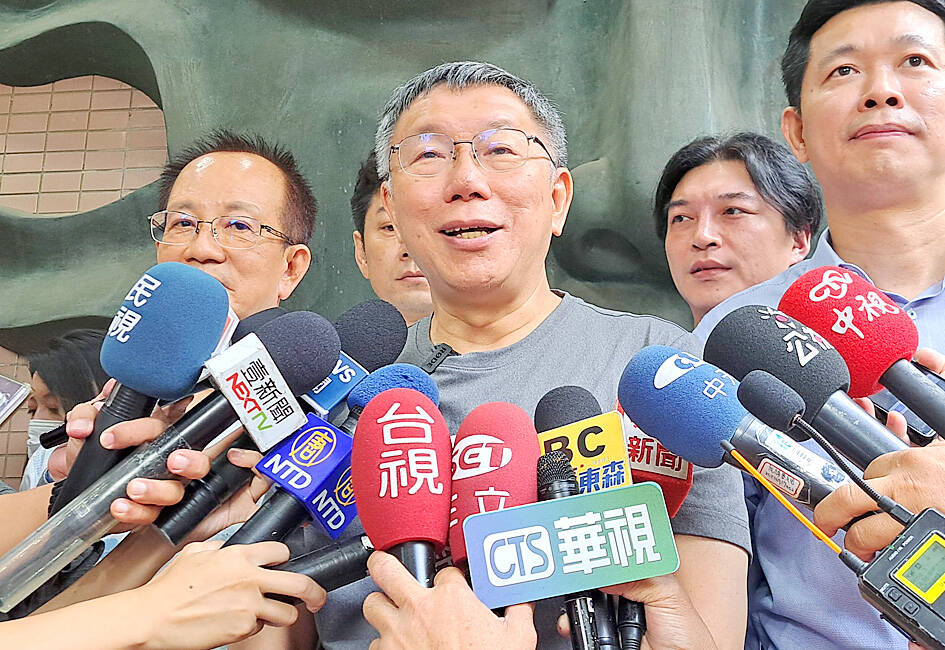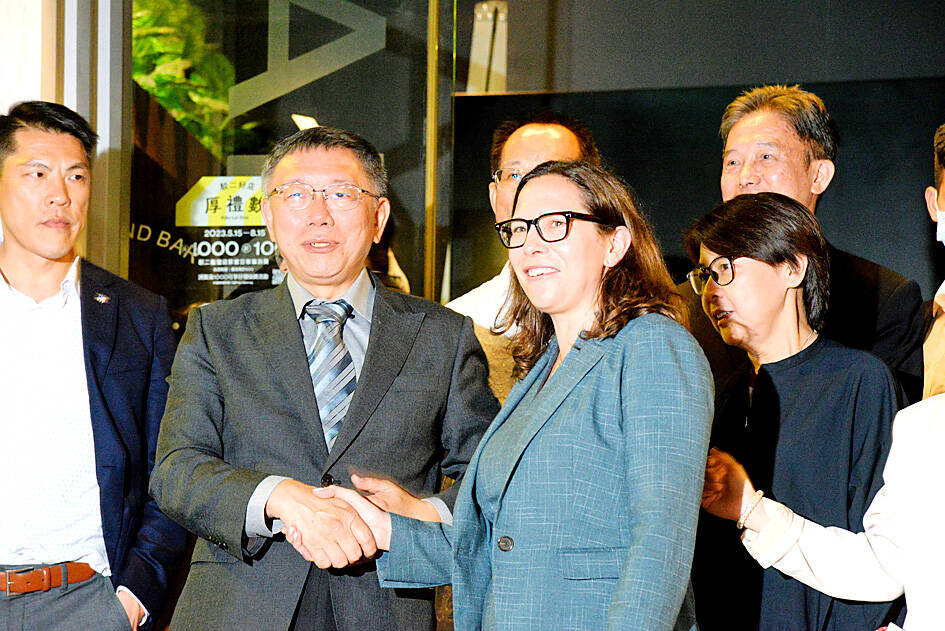China has never clearly stated its interpretation of the so-called “1992 consensus,” Taiwan People’s Party (TPP) presidential candidate Ko Wen-je (柯文哲) said, adding that he would ask Beijing to do so if he is elected.
In an interview on Tuesday in Japan with the Asahi Shimbun, Ko was asked what he thought of China’s demand that Taiwan accept the “1992 consensus.”
The “1992 consensus” — a term that former Mainland Affairs Council chairman Su Chi (蘇起) in 2006 admitted making up in 2000 — refers to a tacit understanding between the Chinese Nationalist Party (KMT) and the Chinese Communist Party that both sides of the Taiwan Strait acknowledge that there is “one China,” with each side having its own interpretation of what “China” means.

Photo: Lee Hui-chou, Taipei Times
The Democratic Progressive Party (DPP) rejects the “1992 consensus,” saying that agreeing to it implies acceptance of China’s claim over Taiwan.
“The problem is that China itself has not made clear its definition of the ‘1992 consensus,’” Ko said in the interview, adding that if he is elected president, he will ask Beijing to give a clear, official interpretation of the consensus.
Ko, who returned to Taiwan on Thursday night from visiting Japan, said he did not make such a request to Beijing during his eight-year tenure as Taipei mayor, but he knew that China had accepted his preferred formulation as a basis for dialogue — that both sides of the Taiwan Strait are “one family.”

Photo: Hsu Li-chuan, Taipei Times
Ko was also asked if he thought he was more capable than the other two presidential candidates — New Taipei City Mayor Hou You-yi (侯友宜) of the KMT and Vice President William Lai (賴清德) of the DPP — of engaging in dialogue with Beijing.
Ko said the KMT had lost the public’s trust on issues relating to China.
“The reason the Sunflower movement emerged [in 2014] was because the KMT had gotten involved in dealings with China without gaining the trust of the Taiwanese public,” he said.
The DPP, meanwhile, is incapable of engaging with China, because there is no mutual trust, and the two sides are constantly fighting, Ko added.
Asked how Taiwan and China could peacefully coexist, Ko said it was important to remember that “the current China is not how China will be forever.”
“China will change,” Ko said. “Just as we shouldn’t use ideas from 30 years ago to solve today’s problems, we shouldn’t use today’s situation to speculate on what things will be like 30 years from now.”
He said that at best, predictions can only be made five to 10 years ahead, not even 15 years.
In an interview later on Wednesday with Japanese public broadcaster NHK, Ko was asked about Taiwan’s sovereignty claims over the disputed Diaoyutai Islands (釣魚台).
Ko said that in general, Taiwanese people are not interested in having “that piece of land,” but they do want to maintain their rights to fish there.
That comment quickly drew flak from the DPP and KMT.
Trying to walk back Ko’s statement, his campaign office said that Ko is committed to protecting Taiwanese sovereignty.
At the same time, Ko believes it is necessary to “start with the reality” of the situation, and he took the opportunity to stand up for the rights to livelihood of Taiwanese fishers, his campaign spokeswoman Chen Chih-han (陳智菡) said.
Meanwhile, in Kaohsiung yesterday, Ko held a closed-door meeting with American Institute in Taiwan Chair Laura Rosenberger for about two-and-a-half hours.
Rosenberger also met with Hou on Wednesday and Lai on Thursday.
Additional reporting by Hsu Li-chuan

Chinese spouse and influencer Guan Guan’s (關關) residency permit has been revoked for repeatedly posting pro-China videos that threaten national security, the National Immigration Agency confirmed today. Guan Guan has said many controversial statements in her videos posted to Douyin (抖音), including “the red flag will soon be painted all over Taiwan” and “Taiwan is an inseparable part of China,” and expressing hope for expedited reunification. The agency last year received multiple reports alleging that Guan Guan had advocated for armed reunification. After verifying the reports, the agency last month issued a notice requiring her to appear and explain her actions. Guan

GIVE AND TAKE: Blood demand continues to rise each year, while fewer young donors are available due to the nation’s falling birthrate, a doctor said Blood donors can redeem points earned from donations to obtain limited edition Formosan black bear travel mugs, the Kaohsiung Blood Center said yesterday, as it announced a goal of stocking 20,000 units of blood prior to the Lunar New Year. The last month of the lunar year is National Blood Donation Month, when local centers seek to stockpile blood for use during the Lunar New Year holiday. The blood demand in southern Taiwan — including Tainan and Kaohsiung, as well as Chiayi, Pingtung, Penghu and Taitung counties — is about 2,000 units per day, the center said. The donation campaign aims to boost

The Kaohsiung Tourism Bureau audited six hotels in an effort to prevent price gouging ahead of Korean band BTS’ concert tour in the city scheduled for Nov. 19, 21 and 22 this year. The bureau on Friday said that the audits — conducted in response to allegations of unfair pricing posted on social media — found no wrongdoing. These establishments included the local branches of Chateau de Chine, Hotel Nikko, My Humble House, and Grand Hai Lai, it said, adding that the Consumer Protection Commission would have penalized price gougers had the accusations been substantiated. The bureau said the Tourism Development Act

BACK TO WINTER: A strong continental cold air mass would move south on Tuesday next week, bringing colder temperatures to northern and central Taiwan A tropical depression east of the Philippines could soon be upgraded to be the first tropical storm of this year, the Central Weather Administration (CWA) said yesterday, adding that the next cold air mass is forecast to arrive on Monday next week. CWA forecaster Cheng Jie-ren (鄭傑仁) said the first tropical depression of this year is over waters east of the Philippines, about 1,867km southeast of Oluanpi (鵝鑾鼻), and could strengthen into Tropical Storm Nokaen by early today. The system is moving slowly from northwest to north, and is expected to remain east of the Philippines with little chance of affecting Taiwan,